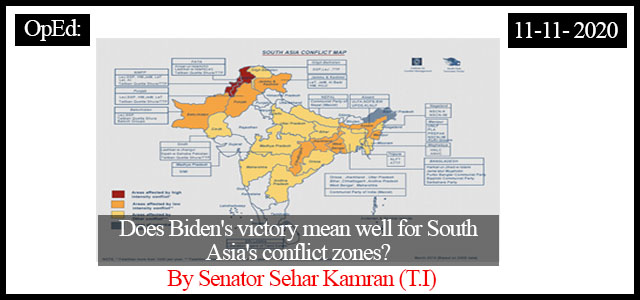 Islamabad The people of the United States have spoken in overwhelming numbers. President Donald Trump was voted out of office after serving only one term, an unusual occurrence for an incumbent US President in recent history.
Islamabad The people of the United States have spoken in overwhelming numbers. President Donald Trump was voted out of office after serving only one term, an unusual occurrence for an incumbent US President in recent history.
Joseph Robinette Biden Jr. and Kamala Harris have been elected the 46th President and Vice President, respectively. The Vice President-elect made history as she will not only be the first woman to hold this public office, but also the first African American and first woman of South Asian origin.
The US election was clouded by months of divisive rhetoric, polarizing stances, chaos and pandemic politics. Even after unofficial election results were announced, and victory speeches were made by the winning democratic candidates, President Trump has so far refused to concede.
Despite domestic uncertainty, the congratulatory messages have been pouring in from foreign leaders around the globe. Owing to the US’s international clout and influence, a question that arises is: What does a Joe Biden victory mean for the world? Will we see a reversal or continuation of Trump’s foreign policy objectives? Will we see the US leading in global anti-COVID19 and prevention of climate change initiatives and research?
Will the US rejoin the Paris Agreement and the World Health Organisation? Will the Joint Comprehensive Plan of Action commonly known as the Iran deal be revived? Will the US adopt an outward approach or retain its policy of looking inwards?
In the context of the South Asian region, it has been heartening to see that the Biden-Harris campaign’s election manifesto clearly voiced concern over abysmal human rights conditions and criticised the draconian measures implemented in Indian-administered Kashmir.
The Biden-Harris campaign also expressed apprehension over the growing extremist tendencies in India as well as the measures in the form of the national registration list and its aftermath, which specifically targets Muslims, by the current RSS-led Hindutva regime sitting in New Delhi. It needs to be seen if the new US administration will be able to take any substantial action to hold New Delhi accountable for its human rights violations and targeting of minorities, or whether it will be business as usual.
In the context of the South Asian region, it was heartening to see that the Biden-Harris campaign’s election manifesto clearly voiced concern over abysmal human rights conditions and criticized the draconian measures implemented in Indian-administered Kashmir.
Sehar Kamran
On the other hand, Afghanistan remains a pressing international issue and the battleground of the longest US involvement in any international conflict.
The Afghan President has called on President-elect Biden to “help fight terrorism”, whereas, Taliban have called on the new President-elect to abide by the peace deal. Despite the US-Taliban peace deal which took place earlier this year, it remains to be seen how the new US administration deals with power-brokers in Afghanistan and how regional players facilitate peace talks.
A big question mark remains the timeline of US troop withdrawal from the country, without leaving a power vacuum behind. As history is witness, that will only give rise to militias and non-state actors in the country which will further destabilize the region in general and the world at large.
Pakistan which is the most-affected country of the Afghanistan conflict cannot afford any more instability on its Western border.
Islamabad has consistently advocated for an Afghan-led, Afghan-owned peace process, facilitated the peace talks so-far, and paid a heavy price both physically and financially. Only time will tell what a post-US troop withdrawal Afghanistan looks like and how it impacts the region.
In Islamabad’s policy circles, it is hoped that President-elect Biden will help strengthen bilateral ties between the two countries. Owing to his experience as the former Vice President and the former Chairman of the Senate Foreign Relations Committee, he understands the complexities of the Af-Pak region, and has connections within Pakistan’s civil military bureaucracy.
Despite this backdrop, it remains to be seen how the new US administration’s relationship plays out with Pakistan. Will it help convert Pakistan-US’s longstanding transactional nature of bilateral relations, for once? Pakistan will have to navigate these uncertain waters with caution and optimism.
A version of this article is posted on The Arabnews pk


